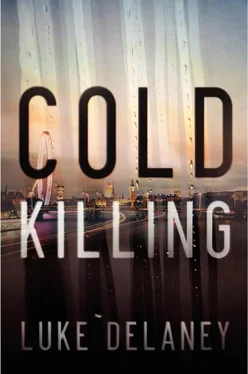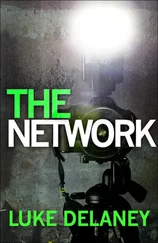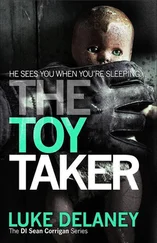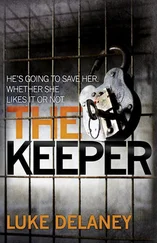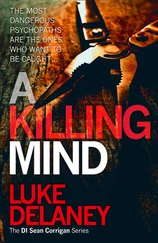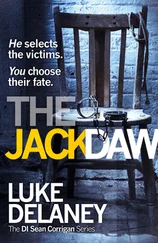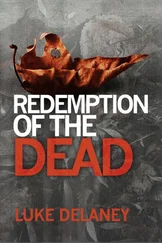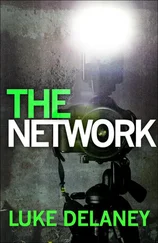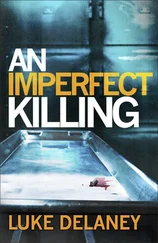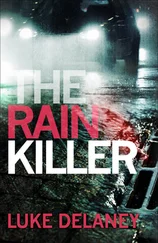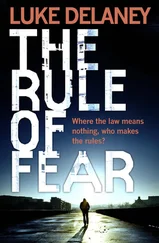Luke Delaney - Cold Killing
Здесь есть возможность читать онлайн «Luke Delaney - Cold Killing» — ознакомительный отрывок электронной книги совершенно бесплатно, а после прочтения отрывка купить полную версию. В некоторых случаях можно слушать аудио, скачать через торрент в формате fb2 и присутствует краткое содержание. Жанр: Триллер, на английском языке. Описание произведения, (предисловие) а так же отзывы посетителей доступны на портале библиотеки ЛибКат.
- Название:Cold Killing
- Автор:
- Жанр:
- Год:неизвестен
- ISBN:нет данных
- Рейтинг книги:4 / 5. Голосов: 1
-
Избранное:Добавить в избранное
- Отзывы:
-
Ваша оценка:
- 80
- 1
- 2
- 3
- 4
- 5
Cold Killing: краткое содержание, описание и аннотация
Предлагаем к чтению аннотацию, описание, краткое содержание или предисловие (зависит от того, что написал сам автор книги «Cold Killing»). Если вы не нашли необходимую информацию о книге — напишите в комментариях, мы постараемся отыскать её.
Cold Killing — читать онлайн ознакомительный отрывок
Ниже представлен текст книги, разбитый по страницам. Система сохранения места последней прочитанной страницы, позволяет с удобством читать онлайн бесплатно книгу «Cold Killing», без необходимости каждый раз заново искать на чём Вы остановились. Поставьте закладку, и сможете в любой момент перейти на страницу, на которой закончили чтение.
Интервал:
Закладка:
“And why is it you want to understand those things?”
“It’s my job.”
“No,” Gibran said, still smiling slightly. “That’s too simple a reason.”
“Then why do I want to know?” Sean risked asking for Gibran’s opinion.
“Fear,” Gibran answered. “Because we fear what we do not understand. So we label everything: a nice, neat explanation hanging around a murderer’s neck. He killed because he loved. He killed because he hated. He killed because he’s schizophrenic. The labels take away the fear.”
“Then what should we put on your label?” Sean asked.
Gibran’s smile grew wider as he leaned back from the table. “Why don’t we just leave it blank,” he answered. “It would be so much more interesting, don’t you agree?”
“It won’t help you in court,” Sean reminded him. “Life imprisonment doesn’t have to mean life.”
“I understand you’re trying to help me, Inspector, but from what I can tell, you’re a long way from convicting me of anything.”
“You will be convicted,” Sean assured him. “Be in no doubt of that.”
“You sound very sure of an unsure thing,” Gibran said. “But I’ll make you a deal. If I’m convicted of these crimes, then we’ll talk again, maybe in more detail. If your evidence fails you and I walk away a free man, then we shall never discuss the matter again.”
“Confessions after conviction are worth nothing,” Sean told him.
“Maybe not to the court, but to you it would be worth a great deal, I believe.”
Sean sensed Gibran was trying to end the interview. Was he tiring? The effort of attempting to appear sane and polite exhausting him? Sean had to keep going.
“Tell me about yourself,” he said. “Tell me about Sebastian Gibran.”
“The short, abridged history of Sebastian Gibran? Very well. I was born forty-one years ago in Oxfordshire. I am the second oldest of four children, two boys and two girls. My father was something big in agriculture, while my mother was left to raise us. We were quite wealthy, although not rich. I was privately educated at a very good local school, where I did well enough to gain a place at the London School of Economics.
“Armed with a degree in business finance I made my way into the big bad world and became a valued employee of Butler and Mason International Finance. I rose through the ranks to become one of the senior partners. I am married with two adorable children, one of each. Quite an unremarkable life, I’m afraid.”
“Until recently,” Sean said, studying Gibran intensely. “Until something that is indeed remarkable happened to you. You changed. Something inside of you couldn’t be restrained any longer.”
“I’m not mentally ill, Inspector. I don’t hear voices in my head telling me to kill. There is nothing in me that cannot be restrained. Nothing I do not control. I am no human monster created by my background. My childhood was a happy one. My parents loving, my siblings supportive, and my friends numerous. I didn’t pull the legs off spiders when I was a boy. I didn’t bite my classmates at nursery or torture and kill the family pets.”
“Then why?”
“Why what?”
Sean swallowed his growing frustration. “Why did you kill those people? Daniel Graydon. Heather Freeman. Linda Kotler. Why was it so important to you that they died?”
“And you want me to tell you so you can understand me?” Gibran asked. “You want me to take away your fear.”
“Yes,” Sean responded.
“There’s really no point,” Gibran said dismissively. “I have no answer that could satisfy your need to know why. There is nothing I could tell you that could possibly help you understand. In some ways I wish there were, but there really isn’t.”
“Try me,” Sean insisted.
More silence, then Gibran spoke. “Tell me, Inspector, are you familiar with the fable of the frog and the scorpion?”
“No,” Sean answered.
“One day,” Gibran began, “a frog was basking on the banks of a river when suddenly his slumber was disturbed by an anxious voice. When the frog opened his eyes, he saw a scorpion standing only inches away. Understandably nervous, the frog hopped away, then a pleading voice stopped him. ‘Please, Mr. Frog,’ the scorpion said. ‘I simply must get to the other side of this river, but I can’t swim. Could I please crawl onto your back while you carry me to the other side?’
“ ‘I can’t do that,’ answered the frog, ‘because you are a scorpion and you will sting me.’
“ ‘No,’ said the scorpion. ‘I won’t sting you. I promise.’
“ ‘How can I take the word of a scorpion?’ the frog asked.
“ ‘Because if I sting you while we are crossing the river,’ the scorpion explained, ‘we will both drown.’
“The frog thinks about what the scorpion has said. Won over by his logic, he agrees to take the scorpion to the other side. But as they are crossing the river, the scorpion does indeed sting the frog.
“With his dying breath the frog asks, ‘Why did you do that, for surely now we both will die?’
“ ‘I couldn’t help myself,’ the scorpion tells him. ‘It’s my nature.’
“I always feel sorry for the scorpion,” Gibran continued, “but never for the frog.”
Sean let a few minutes elapse before he spoke. “Are you telling me you killed four people for no reason other than you believe it’s in your nature to?”
“It’s just a story,” Gibran answered. “One that I thought might appeal to you in particular.”
“Let me tell you why I think you killed these people,” Sean said. “You killed them because it made you feel special. Made you feel important. Without it, your life felt pointless. Making money for other people: pointless. You felt pointless. And you couldn’t stand that empty feeling, every day having to admit to yourself that you were just another nobody, living a nobody’s life. Every single day, the same feeling of emptiness, of nothingness. It drove you insane.
“You could have been anything you wanted to be. Life gave you all the privileges and opportunities, but you didn’t have the courage to do anything truly special, to do anything that would set you apart from other men. You believe we should all bow down to you merely because of who you are. But nobody did and it made you angry, angry at the world.
“So you decided to teach us a lesson, didn’t you? You decided to show us how special you are by doing the only thing your feeble mind could conceive of. Your twisted sense of self-importance convinced you it was your right, your destiny, to kill. It excused your crimes-and crimes are all they are, no matter what you may think.
“But committing murder doesn’t make you special. It doesn’t make you anything other than one more sick loser, no better than all the other sick losers locked up in Broadmoor. You can talk about scorpions and your nature and any other bullshit you like, but we both know that, deep down, underneath this polished act, this mock menace, you are nothing. Nothing at all.”
“If believing that makes you comfortable,” Gibran responded, “if it takes away your fear, then you should cling to that belief.”
Sean knew then that Gibran wasn’t going to talk, wasn’t going to confess and explain all. He had to come to terms with the fact that they might never know why. He felt Gibran studying him, expressionless.
“What about Hellier?” he asked, making one last-ditch effort to bring him back. “What was his part in all of this? Were you working together?”
“James could never be anything other than my employee,” Gibran answered. “I would never dirty my hands working with him as an equal. That could never happen. He was a tool to be used by me to achieve what I needed to achieve. He was nothing more than an illusion. James was made by circumstance, a cheap man-made replica. Pathetic, really. I was born to achieve all that I have achieved. The path I was ordained to follow formed while I was still in my mother’s womb.”
Читать дальшеИнтервал:
Закладка:
Похожие книги на «Cold Killing»
Представляем Вашему вниманию похожие книги на «Cold Killing» списком для выбора. Мы отобрали схожую по названию и смыслу литературу в надежде предоставить читателям больше вариантов отыскать новые, интересные, ещё непрочитанные произведения.
Обсуждение, отзывы о книге «Cold Killing» и просто собственные мнения читателей. Оставьте ваши комментарии, напишите, что Вы думаете о произведении, его смысле или главных героях. Укажите что конкретно понравилось, а что нет, и почему Вы так считаете.
